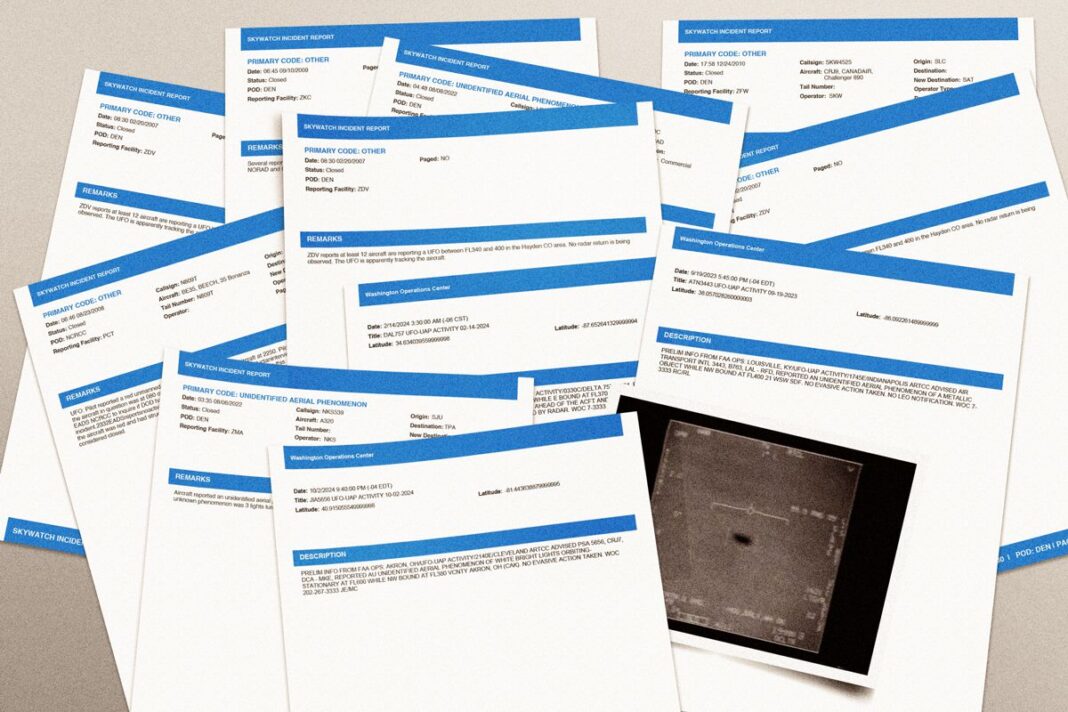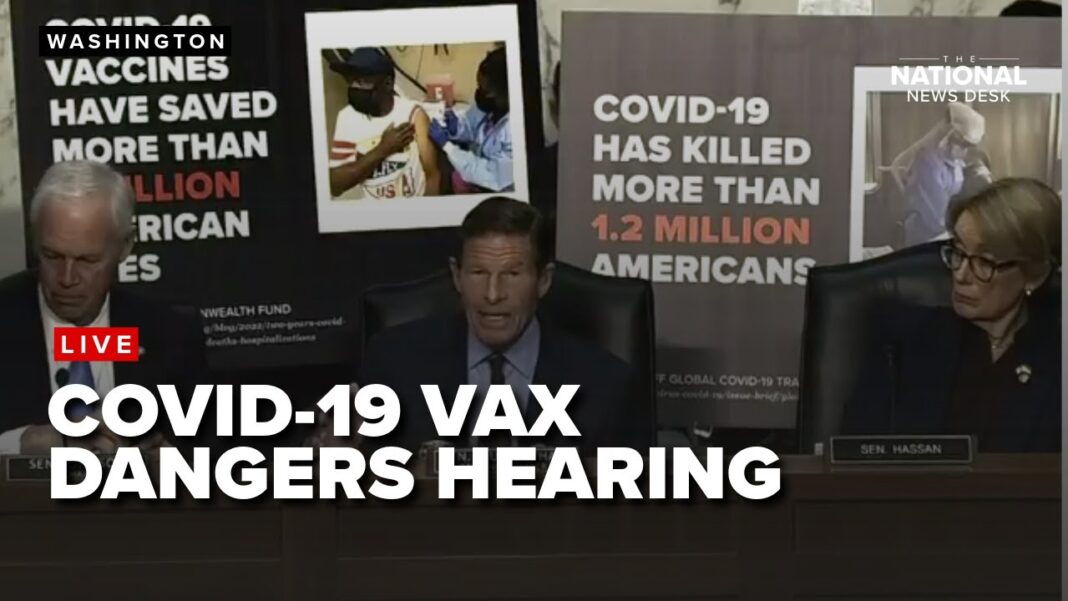Though a popular leading man of his era, actor Robert Taylor (1911-1969) was not afraid to risk his successful film career by diving into Hollywood politics in the 1940s. In fact, many critics and reviewers of today express a dislike for Taylor, his acting, and his films because of his markedly conservative stance. This is perhaps the reason he and his films have been practically “buried” in Hollywood’s past, unlike left-leaning icons such as Henry Fonda and Spencer Tracy.
Taylor once admitted that he’d “never cared a lot for politicians”, whether they were Republican or Democrat. He also didn’t believe it was inherent in his career to “aid in feathering any of their nests for them via publicity from my name.” Just how much weight did Robert Taylor’s name hold at the time? Back in 1937, he was ranked as Hollywood’s third most-popular star. He had recently starred in the classic Waterloo Bridge (1940), and was known as “The Man with the Perfect Profile”.
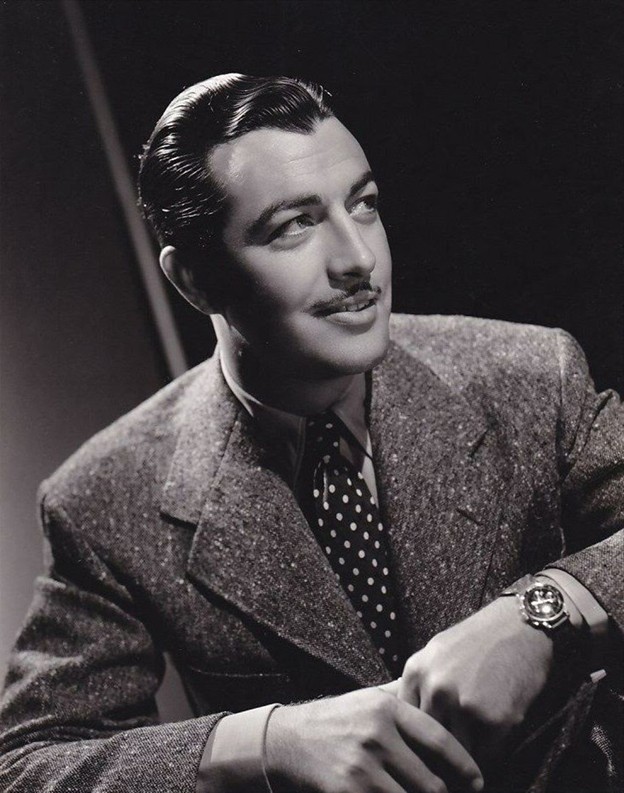
Still, Taylor, who was very firm in his beliefs, was not concerned about how those beliefs would reflect upon his career at MGM studios. In 1944, Taylor and other fellow actors, including Clark Gable, Hedda Hopper, Irene Dunne, Gary Cooper, Ginger Rogers, Barbara Stanwyck, and John Wayne, founded the Motion Picture Alliance for the Preservation of American Ideals. It was “dedicated to the preservation and continuance of the American scene and the American way of life.” The Alliance started lobbying for the House of Un-American Activities (HUAC) to investigate Communist influence in Hollywood. Taylor was a foremost force, a “stalwart”, along with friend and fellow actor Ronald Reagan. (From 1939-1952, Taylor was married to actress Barbara Stanwyck, who also shared similarly conservative beliefs.)
Robert Taylor’s political creed can be summed up in his 1951 statement, “I am pro-freedom and pro-decency.” In the 1950s, a Hollywood magazine ran a feature written by the star entitled “Ten Things That Make My Heart Beat Faster”, No. 6 on the list being “the integrity of Eisenhower”. Taylor supported Dewey in the presidential races of 1944 and 1948, and Eisenhower in 1952 and 1960.
Years later, Taylor would be briefly and quietly considered as a candidate for California governor. He possessed good leadership qualities, was direct, down-to-business, and serious. However, his friend Ronald Reagan was selected as the gubernatorial candidate. Taylor perhaps had a grimmer outlook on things than Reagan (“The Middle East is going to get us into the third world war” he predicted). Instead, he campaigned for Reagan.
Song of Russia
One particular film caused Taylor a lot of trouble: Song of Russia(released in 1944), in which he played an American conductor touring the Soviet Union. Although it was touted as a cute “boy meets girl in Russia” story, Taylor would reluctantly testify before a closed hearing of a HUAC sub-committee that the movie’s original script “contained Communist propaganda, but a lot of my friends didn’t agree with me.” He made it quite clear that he didn’t want a Communist “within 100 miles of me, the studio, or the script”. Later the script would be somewhat modified.
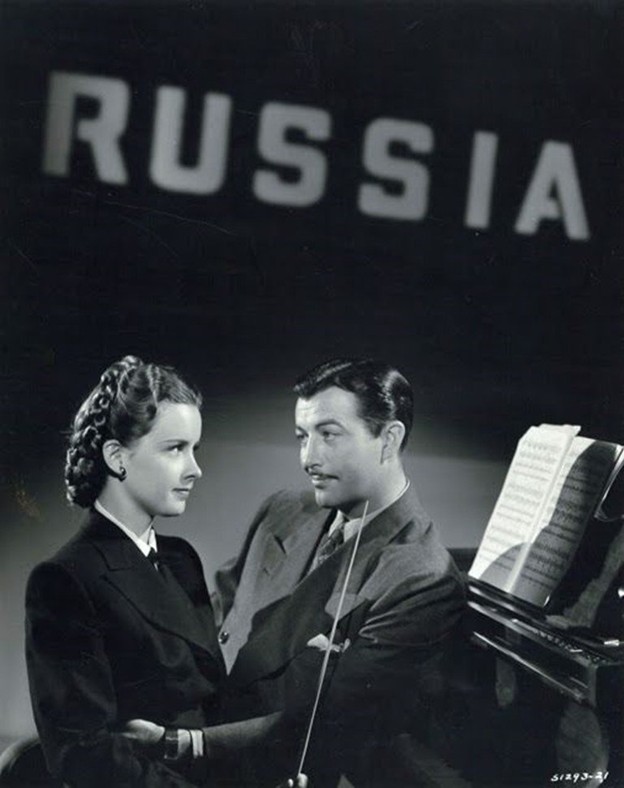
This was not the only problem the film had posed for the actor. Taylor testified in Los Angeles that in 1943, government officials had actually delayed his naval commission until he had finished Song of Russia. However, he added that “In my own defense, lest I look a little silly by saying I was ever forced to do the picture, I was not forced.” After this, Taylor’s studio was obliged to admit that while Taylor had mentioned his commission, they felt Song of Russia was “paramount” to the war effort, and that the Navy had agreed that he could finish the film first. But it was clear that the studio had tampered with Taylor’s request for a naval commission.
The ordeal tarnished the film for Taylor. Producer of the film Louis B. Mayer said that the film was meant to be “a pat on the back for our then ally, Russia”, noting that if there happened to be any Communists at the studio, there was nothing he could do about it.
“This may sound biased,” Taylor said afterward. “However, if I were even suspicious of a person being a Communist with whom I was scheduled to work, I am afraid it would have to be either him or me, because life is a little too short to be around people who annoy me as much as these fellow travelers and Communists do.”
Although Taylor had been promised confidentiality for his Los Angeles testimony, his remarks were quickly published, upsetting Louis B. Mayer, and angering Taylor. Privately, Taylor said, “These investigations, the way they are being run in Washington at the moment, remind me more of a three-ring circus than of a sincere effort to rid the country of a real threat. There’s nothing any of us are going to tell them in Washington that the FBI didn’t know five years ago.”
Testifying before HUAC
He was to be ruffled further by being subpoenaed to testify publicly before the House Un-American Activities Committee (HUAC) in the fall of 1947 about Communist influence in Hollywood. Robert Taylor’s presence caused a furor among his fans as well as curious sight-seekers.
It did indeed seem little more than a “three-ring circus”. As Taylor raised his hand to take the oath, he was rebuked because the photographers couldn’t see his face. Taylor, smiling politely, was doing his duty; but HUAC was well aware of the star’s appeal and was eager to have photographers record the ordeal.


Taylor, in his characteristic, straightforward fashion, laid out his evidence in twenty-five minutes. He was asked for the names of any possible Communists within the Screen Actors Guild (SAG). It was an uncomfortable question, but Taylor was able to answer truthfully without directly labeling anyone as “Communist”. He replied that actor Howard da Silva and actress Karen Morely were “disruptive” during SAG meetings. He also admitted that a number of movie scripts he had viewed “appeared to me to be slightly on the pink [Communist] side”.
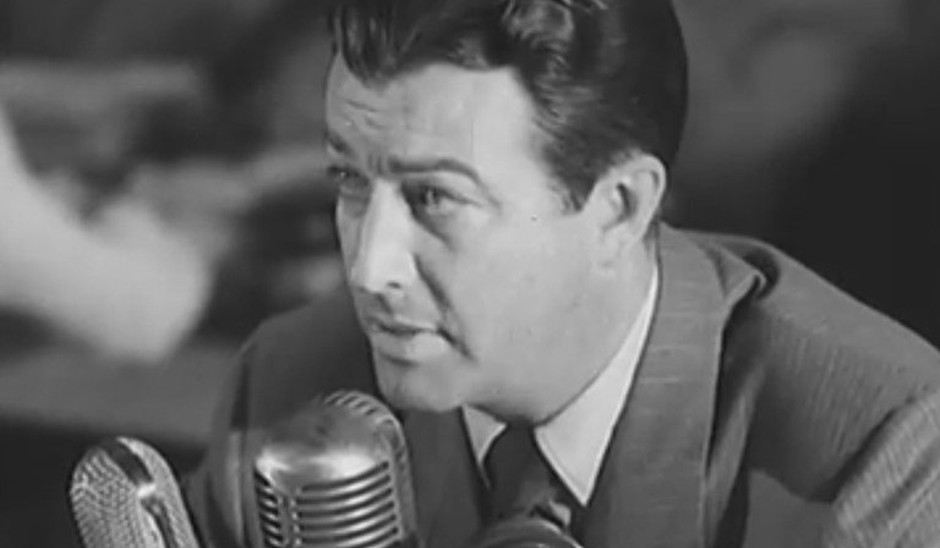
One of the questioners, congressman Richard M. Nixon, mentioned that Taylor had been subjected to “considerable criticism and ridicule from certain left-wing quarters.” To this Taylor replied, “Yes, sir. It didn’t bother me, however. . . . Any time any of the left-wing press or individuals belonging to the left-wing or their fellow traveler groups ridicule me, I take it as a compliment because I really enjoy their displeasure.”
Taylor continued to voice his principles. “I happen to believe strongly enough in the American people to think that they will go along with anybody who prefers America and the American form of government over any other subversive ideologies which might be presented and by whom I might be criticized.” A tremendous applause swept the room.
Following Taylor’s testimony before HUAC, his fans reacted favorably toward his stance. In return, he was noticeably grateful for their support, and continued his devotion to the ideals of freedom and decency.
Sadly, Robert Taylor was diagnosed with lung cancer toward the end of the 1960s and passed away in 1969. His friend and then-governor of California, Ronald Reagan, gave the eulogy at his funeral.





